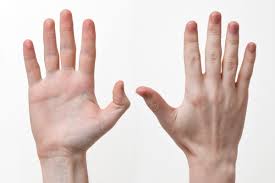hand
英 [hænd]
美 [hænd]
- n. 手,手艺;帮助;指针;插手
- vt. 传递,交给;支持;搀扶
- n. (Hand)人名;(英、瑞典)汉德
使用频率:

记忆方法
记忆单词“hand”可以使用图像联想法:想象自己伸手(hand out)递给他人一个物品,这样就能在脑海中形成一个清晰的图像,帮助记忆该单词的含义。
以上内容由AI生成, 仅供参考和借鉴
中文词源
hand 手
词源不详。
英语词源
- hand
-
hand: [OE] Hand is a widespread Germanic word (German, Dutch, and Swedish also have it), but it has no relatives outside Germanic, and no one is too sure where it comes from. Perhaps the likeliest explanation is that it is related to Gothic frahinthan ‘seize, pursue’, Swedish hinna ‘reach’, and English hunt, and that is underlying meaning is ‘body part used for seizing’. The derived adjective handsome [15] originally meant simply ‘easy to handle’. The modern sense ‘attractive’ did not develop until the late 16th century.
=> handsome, hunt - hand (n.)
- Old English hond, hand "the human hand;" also "side, part, direction" (in defining position, to either right or left); also "power, control, possession" (on the notion of the hand's grip or hold), from Proto-Germanic *handuz (cognates: Old Saxon, Old Frisian, Dutch, German hand, Old Norse hönd, Gothic handus), which is of uncertain origin. The original Old English plural handa was superseded in Middle English by handen, later hands. Indo-European "hand" words tend to be from roots meaning "seize, take, collect" or are extended from words originally meaning only a part of the hand (such as Irish lam, Welsh llaw, cognate with Latin palma and originally meaning "palm of the hand"). One ancient root, represented by Latin manus (see manual (adj.)) is represented in Old English by mund "hand," but more usually "protection, guardianship; a protector, guardian."
Meaning "manual worker, person who does something with his hands" is from 1580s, hence "hired workman" (1630s) and "sailor in a ship's crew" (1660s). Meaning "agency, part in doing something" is from 1590s. Clock and watch sense is from 1570s. Meaning "round of applause" is from 1838. The linear measure of 4 inches (originally 3) is from 1560s, now used only in giving the height of horses. The meaning "playing cards held in one player's hand" is from 1620s; that of "a round at a card game" is from 1620s. Meaning "handwriting" is from late 14c.; also "one's style of penmanship" (early 15c.). The word in reference to the various uses of hands in making a pledge is by c. 1200; specifically "one's pledge of marriage" by late 14c.
First hand, second hand, etc. (mid-15c.) are from the notion of something being passed from hand to hand. At hand is from c. 1200 as "near in time," c. 1300 as "within reach." Out of hand (1590s) is opposite of in hand "under control" (c. 1200). Adverbial phrase hand-over-fist (1803) is nautical, suggestive of hauling or climbing by passing the hands one before the other alternately. To win something hands down (1855) is from horse racing, from a jockey's gesture of letting the reins go loose in an easy victory.The Two Thousand Guinea Stakes was not the best contested one that it has been our fortune to assist at. ... [T]hey were won by Meteor, with Scott for his rider; who went by the post with his hands down, the easiest of all easy half-lengths. Wiseacre certainly did the best in his power to spoil his position, and Misdeal was at one time a little vexatious. ["The Sportsman," report from April 26, 1840]
Phrase on the one hand ... on the other hand is recorded from 1630s, a figurative use of the physical sense of hand in reference to position on one side or the other side of the body (as in the lefthand side), which goes back to Old English Hands up! as a command from a policeman, robber, etc., is from 1863, from the image of holding up one's hands as a token of submission or non-resistance. Hand-to-hand "in close contact," of fighting, is from c. 1400. Hand-to-mouth is from c. 1500. Hand-in-hand attested from c. 1500 as "with hands clasped;" figurative sense of "concurrently" recorded from 1570s. - hand (v.)
- c. 1400, "take charge of, s
权威例句
- 1. He was hand-picked for this job by the Admiral.
- 他是由海军上将精心挑选出来担任这项工作的。
- 2. Without warning, Bardo smacked his fist into his open hand.
- 巴多没有任何预兆地一拳砸在自己摊开的手掌上.
- 3. All this, needless to say, had been culled second-hand from radio reports.
- 不用说,所有这些都是从电台报道中采集来的二手材料。
- 4. They would like to hand over their financial affairs to another body.
- 他们想把自己的财务移交给另一个机构管理。
- 5. Sylvia, camera in hand, asked, "Where do we go first?"
- 西尔维娅手里拿着相机问道:“我们先去哪里?”